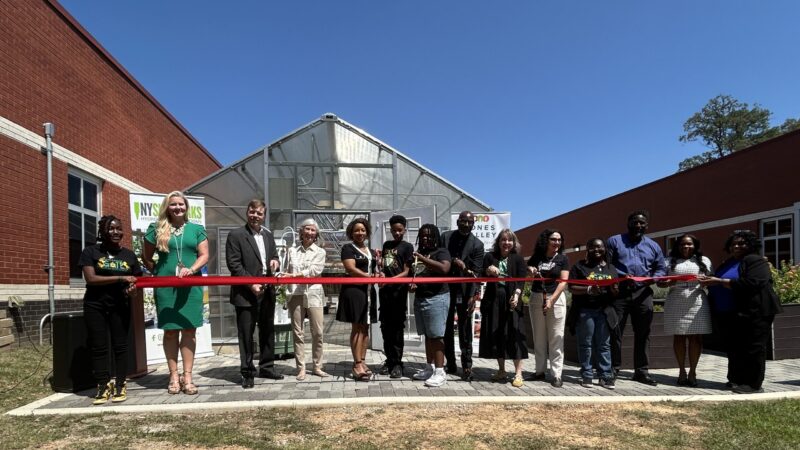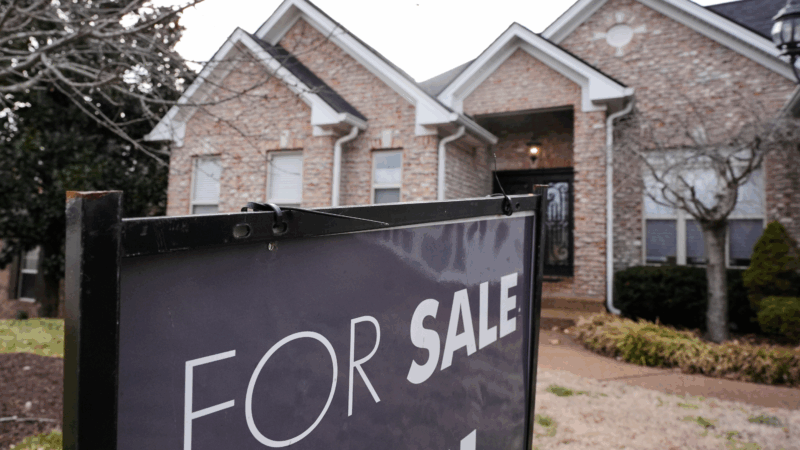No soil required: New York program brings hydroponics to Birmingham students
City councilors, directors of Jones Valley Teaching Farm and NY Sun Works cut a ribbon with students, teachers and staff of the Bush Hills STEAM Academy.
“Welcome to the greenhouse,” said 8th grader Tyler Martin as she stepped inside a greenhouse at the Bush Hills STEAM Academy in Birmingham. She took a basil seedling from a growing tower, showing how its roots are tangled in a sponge-like pod of peat.
“The water soaks into that, and it helps the plant grow up,” Martin said. “See how it’s starting to grow?”
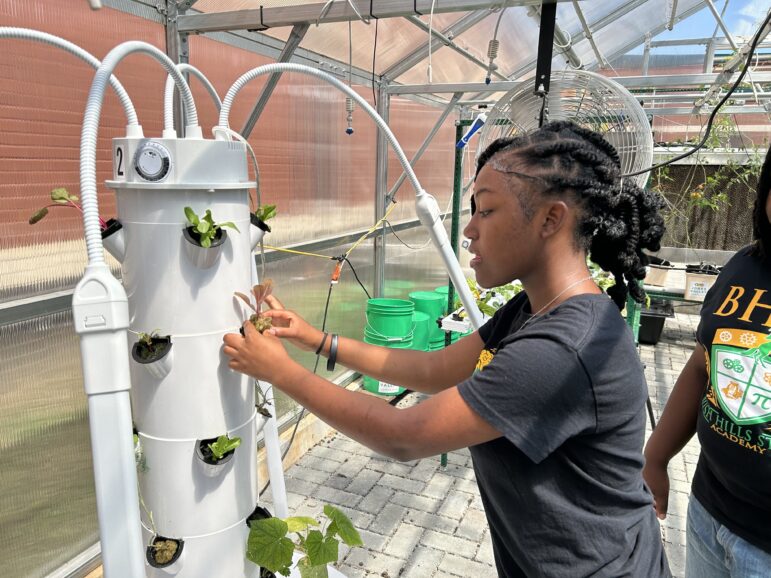
She is one of the students in eight Birmingham City Schools who will take part in a first of its kind hydroponics program in the city. The program aims to teach students about sustainable food practices and how to combat food deserts in their communities. It comes through a partnership with the New York-based non-profit New York Sun Works and Birmingham’s Jones Valley Teaching Farm. The project strives to create pathways to higher education and careers while growing thousands of pounds of fresh produce.
Hydroponics uses only water with powdered, dissolved electrolytes and nutrients to grow plants — no soil required. Martin’s classmate, Deandre Hall, explained that the irrigating growing tower is made for people who may not have much access to water.
“It reuses the water to water the plants,” he said, adding that hydroponics uses 90% less water than traditional irrigation.
The students later give a tour to Mayor Randall Woodfin, who tried, and apparently enjoyed, a cherry tomato already growing on a vine at the back of the greenhouse.
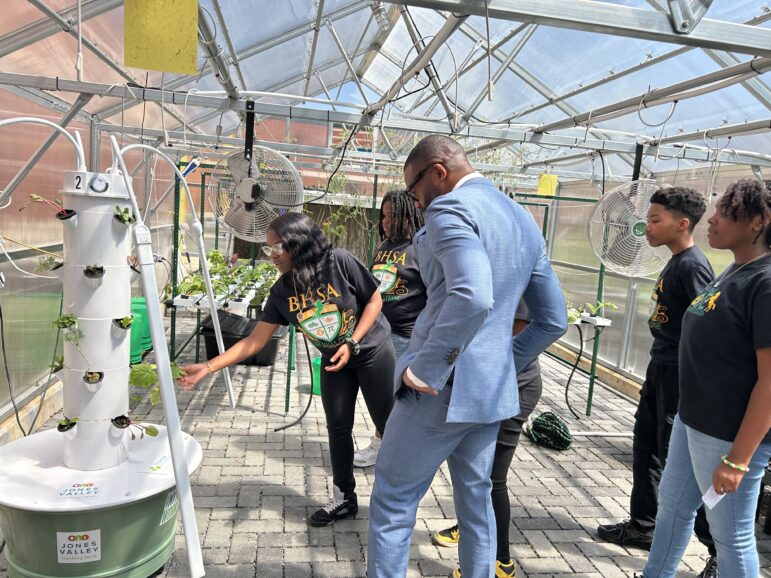
While hydroponics can’t be used to grow every kind of plant, Manuela Zamora, executive director of New York Sun Works said hydroponics is best used on leafy vegetables like lettuce, also peppers, cucumbers and cherry tomatoes. Students in Birmingham schools are now set to grow thousands of pounds of produce for their community.
“We’re connecting the students with a hands-on and project-based approach to learning science while they are growing plants from seed to harvest,” Zamora said.
Zamora said the students will learn about how hydroponics fits into the larger world of farming.
“Why are we doing this if we have traditional agriculture?” Zamora said. “Well, maybe because you want to maximize those leafy greens in hydroponic technology while leaving space for those other plants in soil.”
She added that the program represents the future of agriculture as a method of preserving both healthy soil and water while maximizing the growth of specific plants and vegetables.
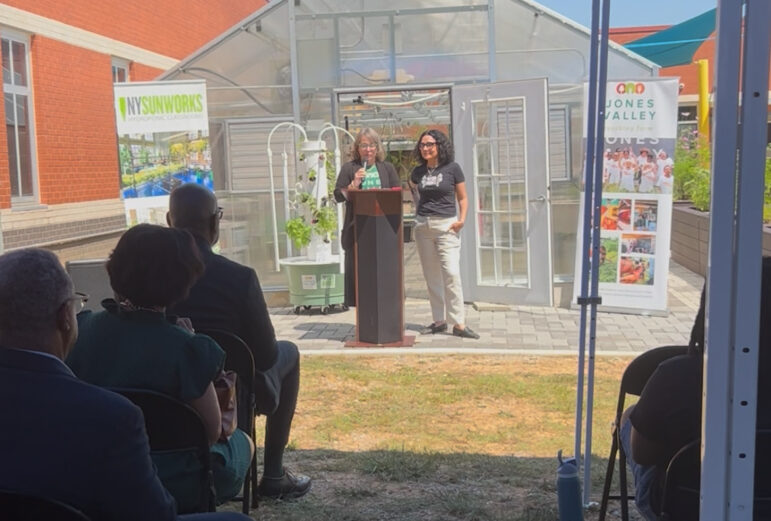
Eighth grader Kierra Norris said even though hydroponics classes are just beginning, she and her classmates are already learning about how the world of sustainable food practices can be applied in their own lives.
“We live in a food desert,” Norris said. “It’s very useful to us to have something to grow without any soil available to us.”
These major issues have brought together Democrats and Republicans in states
Across the country, Republicans and Democrats have found bipartisan agreement on regulating artificial intelligence and data centers. But it's not just big tech aligning the two parties.
Feds announce $4.1 billion loan for electric power expansion in Alabama
Federal energy officials said the loan will save customers money as the companies undertake a huge expansion driven by demand from computer data centers.
Mortgage rates fall below 6% for the first time in years
The average home loan rate has dropped below 6% for the first time since 2022. Will that help thaw the frozen housing market?
Baby Keem’s boulevard of broken dreams
Ca$ino, the rapper's second album for his cousin Kendrick Lamar's label, is whiplash embodied, a mirror for the extreme highs and lows of his Sin City hometown.
Pentagon shifts toward maintaining ties to Scouting
Months after NPR reported on the Pentagon's efforts to sever ties with Scouting America, efforts to maintain the partnership have new momentum
Why farmers in California are backing a giant solar farm
Many farmers have had to fallow land as a state law comes into effect limiting their access to water. There's now a push to develop some of that land… into solar farms.

